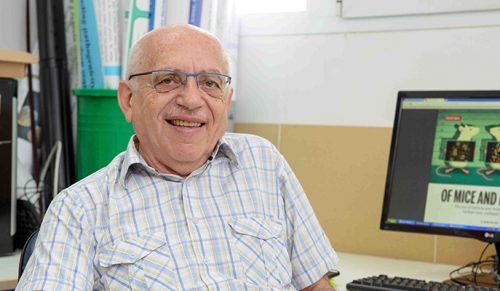Visiting scientist Dr. Silvio Pitlik - former head of a department at the "Bilinson" hospital - disapproves of antibiotics, on the one hand, but also does not think that the resistant bacteria will eradicate them, on the other hand.

During the 43 years that Dr. Silvio Pitlik was an internist and department manager at the "Bilinson" hospital, he was involved in approximately 100,000 cases of giving antibiotics to patients. In many of them, he believes, the antibiotic was not essential, and the patients would probably have been healthy even without it. "The American Center for Disease Control and Prevention (CDC) claims that about 50% of the incidents of antibiotics are unnecessary. In my opinion, the number is higher, and even reaches 80%," says Dr. Pitlik (71), who upon his retirement from the hospital joined, as a visiting scientist, Prof. Rotem Sorek's research group in the Department of Molecular Genetics at the Weizmann Institute of Science.
Already at the beginning of his career as a doctor, says Dr. Pitlik, he had mixed feelings about antibiotics. "I had an intuitive feeling that antibiotics, despite all the crowns that have been attached to it, are not a cakewalk," he says, "and this is why, for example, I have never given antibiotics to my children. There are, of course, situations where there is no choice, but as much as possible with my family, I held back."
Dr. Pitlik's main objection to antibiotics stems from the total destruction it wreaks around her. In other words, the antibiotics not only eliminate the "bad bacteria", which cause the infection, but all the bacteria - some of which have an important contribution to the normal activity of the body's systems. The body's recovery from this attack takes a long time, and sometimes its consequences are irreversible. "Antibiotics are like an atomic bomb dropped on the microbiome (intestinal bacteria)," says Dr. Pitlik. "It harms the bacterial diversity in the body, and therefore, in the long term, health is harmed. Just as the ecological diversity in the Amazon jungle is what gives it resilience and allows the ecosystem to exist over time - for example, a tree provides shelter for a plant smaller than it, the monkey moves seeds from one place to another, and so on - so the microbiome also needs a diversity of bacteria to function well." In order to illustrate this, he asks: "Why do we talk today about fecal transplantation as a therapeutic concept? Because there are people who reach a situation where their bacterial diversity has decreased so much that they have no choice but to introduce bacteria into their bodies from the outside."
Dr. Pitlik of course recognizes the advantages of antibiotics, but in his opinion, in many cases the disadvantages outweigh the advantages, and he explains: "If a person comes to the hospital with an infection in the meninges, it is clear that he must receive antibiotics, since it is a matter of life or death. The antibiotics can also prevent the spread of infections in the community. But caution must be taken with the medicine. Studies have shown, for example, that the more antibiotics children receive, the more likely they are to develop Crohn's disease, which is an inflammatory bowel disease. The connection between the reduction of bacterial diversity in the intestines, due to receiving antibiotics, and obesity is also known. And of course, the more antibiotics are distributed, the greater the chance that the bacteria will develop resistance to the drug."

Antibiotic-resistant bacteria are one of the most difficult problems of future medicine, and many doctors believe so. But surprisingly, Dr. Pitlik is actually not excited by it: "I recognize the existence of resistance, but I don't think this is the 'antibiotic apocalypse.' If we had adopted the prophecies of wrath, we should have already seen dead bodies in the street, and this is not the case. After all, despite the durability, life expectancy all over the world continues to increase. The bottom line is that the resistant bacteria may have advantages that we are not yet aware of. Doctors don't give enough credit to the human body."
As a visiting scientist in the laboratory, Dr. Pitlik reads scientific articles and comments on them, as well as lectures in his areas of practice before the group members. "I came to the laboratory to study and develop thoughts", he describes. "The main thing that interests me is the interaction between the person and the microbiome, in health and illness. One serves the other. The students in the lab are really the main advantage of this place, they give me energy that only young people can give. I feel younger thanks to them. It could be that they are passing me good bacteria."
personal
Dr. Silvio Pitlik, born in Buenos Aires, breathed Zionism in his home from the age of zero, and at the age of 24 immigrated to Israel. "I read about the War of Independence and the establishment of the State of Israel in the 'Davar' newspaper in real time," he says. As a gifted child and teenager, he knew how to read at the age of two ("I taught myself"), and finished his high school studies at the age of 15. Six years later he graduated from medical school, and after serving in the Argentine army immigrated to Israel.
"Twelve days after I arrived in Israel, I started working in Internal Ward C at the 'Bilinson' hospital, the same ward I later managed, from which I retired 12 years later. There are those who claim that I suffer from 'over-stability,'" says humorously Dr. Pitlik, who also served as chairman of the Association for Infectious Diseases for two consecutive terms. The attraction to internal medicine and infectious diseases, he says, stemmed from the desire to engage in "medicine that can, sometimes, be cured. Hippocrates, the 'father of Western medicine', said that healing in medicine is a rare thing, and that doctors mainly provide help. I stayed with this concept."
Prof. Rotem Sorek was introduced to Dr. Pitlik after he gave a lecture in the field of his research to the doctors of the association. "I talked with Rotem and that's how the connection was made, and the thought arose that I would join the laboratory. As usual, I arrived at the laboratory the day after retiring from 'Bilinson,'" says Dr. Pitlik, adding with a smile: "I don't believe in vacations or rest."

3 תגובות
The resistance of bacteria against antibiotics has developed mainly in agriculture, because farm animals just get huge amounts of antibiotics sometimes just for prevention or just because it makes them fat.
There are studies that show that the resistance of bacteria against types of antibiotics has a correlation with the amount of use of that antibiotic in agriculture.
Therefore, the war should be more against the overuse of agriculture and animals and not against the overuse of humans.
The whole problem of eliminating intestinal bacteria can disappear if they start giving antibiotics in patches or injections